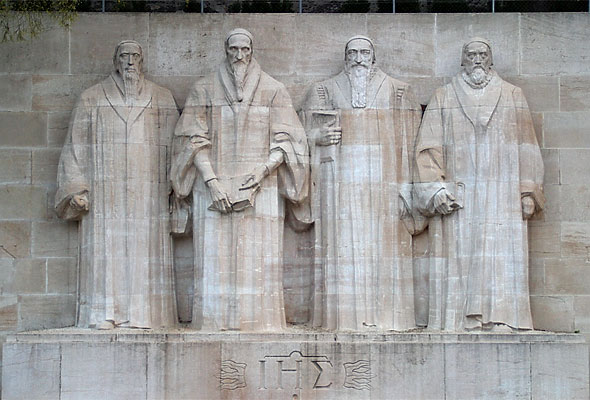“Sola Scriptura,” meaning “Scripture alone” in Latin, is one of the five foundational principles of the Protestant Reformation, famously championed by reformers such as Martin Luther and John Calvin. The doctrine of Sola Scriptura asserts that the Bible is the supreme authority in all matters of faith and practice. It stands as a counterpoint to traditions, teachings, or authorities that attempt to supplement, override, or equal Scripture’s authority. The essence of Sola Scriptura is that God’s Word, as revealed in the Bible, is sufficient for understanding the will of God, the message of salvation, and the guiding principles for Christian living.
Historical Context
The doctrine of Sola Scriptura arose during the 16th-century Protestant Reformation as a direct response to the perceived corruption and overreach of the Roman Catholic Church. At the time, the Catholic Church emphasised Scripture and Church tradition as co-equal sources of authority. Moreover, the authority of the Pope, Church councils, and other ecclesiastical structures were considered infallible in matters of doctrine and practice.
Reformers like Martin Luther challenged this perspective, arguing that the Church had drifted away from the teachings of the Bible by introducing human traditions, indulgences, and non-biblical practices. Luther’s famous nailing of his Ninety-Five Theses in 1517 catalysed a movement seeking to realign Christianity with the original teachings of Scripture. For Luther and the reformers that followed, Sola Scriptura was a rallying cry for returning to the authority of the Bible as the ultimate standard by which all doctrine, moral teaching, and church governance should be measured.
The Biblical Basis for Sola Scriptura
The doctrine of Sola Scriptura finds its roots in the Bible itself. Numerous passages affirm the
sufficiency, authority, and inspiration of Scripture. One of the most cited verses in defence of Sola Scriptura is 2 Timothy 3:16-17, where the Apostle Paul writes:
“All Scripture is inspired by God and is profitable for teaching, for rebuking, for correcting, for
training in righteousness, so that the man of God may be complete, equipped for every good work.” This passage asserts that Scripture is “God-breathed” or inspired, meaning its origin is divine, not human. Furthermore, the text states that Scripture is sufficient to equip the believer for “every good work,” implying that nothing beyond Scripture is necessary for guidance in matters of faith and practice.
Psalm 19:7-8 also speaks to the sufficiency of Scripture, saying:
“The law of the Lord is perfect, reviving the soul; the testimony of the Lord is sure, making wise the simple; the precepts of the Lord are right, rejoicing the heart; the commandment of the Lord is pure, enlightening the eyes.”
Here, the perfection of God’s law is highlighted, emphasising that it provides all that is needed for spiritual revival, wisdom, and guidance.
Jesus Himself reinforced the centrality of Scripture during His earthly ministry. In Matthew 4:4, when tempted by Satan, Jesus responds by quoting Deuteronomy 8:3:
“Man shall not live by bread alone, but by every word that comes from the mouth of God.”
Jesus’ reliance on Scripture as the ultimate authority, even in extreme trials, is a powerful model for believers.
Key Aspects of Sola Scriptura
The Sufficiency of Scripture
At its core, Sola Scriptura declares that Scripture alone can teach believers everything necessary for salvation, faith, and obedience to God. This does not mean that other resources, such as tradition or church teachings, are useless. Still, it asserts that they must be subordinate to the Bible and cannot add to or contradict the truths found in Scripture.
The sufficiency of Scripture rests on the belief that God’s revelation in the Bible is complete and that everything essential for understanding God’s will and plan is contained within its pages. As Paul says in 1 Corinthians 4:6, believers should not “go beyond what is written,” a warning against adding human traditions or teachings not rooted in biblical truth.
The Clarity of Scripture
Another key aspect of Sola Scriptura is the belief in the clarity, or perspicuity, of Scripture. This
means that the essential teachings of the Bible are clear and understandable to all who read it with faith, regardless of their educational or social background. While some parts of the Bible may require careful study, the central message of salvation through Jesus Christ is accessible to anyone who seeks it.
This doctrine was particularly important during the Reformation when the Bible was often kept out of the hands of the laity, and its interpretation was controlled by the clergy. Sola Scriptura emphasises that every believer has the right and responsibility to read and understand the Scriptures for themselves, guided by the Holy Spirit.
The Authority of Scripture
Authority is central to the concept of Sola Scriptura. For Protestants, Scripture is the ultimate and final authority in all matters of faith and doctrine. This authority is above that of church councils, traditions, and even church leaders. While church traditions and teachings can help clarify or illuminate biblical truths, they must always be tested against Scripture.
This was a significant departure from the Roman Catholic view, where Scripture and Tradition (with a capital ‘T’) were seen as complementary sources of authority. The reformers insisted that only Scripture held the final authority because it was divinely inspired.
Challenges and Misconceptions
Misuse of Sola Scriptura can sometimes lead to two major pitfalls:
Individualism and Disunity: Some may interpret Sola Scriptura to mean that every individual is free to interpret Scripture without regard to the Church’s historic teachings or the wisdom of the Christian community. This has sometimes led to fragmentation and division within the church. The reformers, however, were clear that while the Bible is the ultimate authority, the wisdom of church history, creeds, and councils should still be respected, provided they align with Scripture.
Scripture vs. Tradition: A common misconception is that Sola Scriptura dismisses all church
traditions. In reality, reformers valued tradition as long as it was in harmony with the Bible. Traditions such as the some Creeds or the early church’s interpretation of doctrine are honoured, but they are always measured against the unchanging Word of God.
Conclusion
“Sola Scriptura” remains one of the central pillars of Protestant theology, affirming that God’s Word is sufficient, clear, and authoritative for all matters of faith and practice. It calls believers to root their faith in Scripture alone, recognizing that while traditions and teachings may have value, they must always be subordinate to the ultimate authority of God’s Word. For Christians today, Sola Scriptura is a reminder to always turn to the Bible as the definitive source of truth, guidance, and wisdom for living a life that honours and glorifies God.
In the words of Isaiah 40:8: “The grass withers, the flower fades, but the word of our God will stand forever.”

